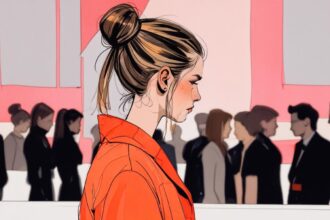In response to growing public outcry and protests from artists, the government contemplates amending copyright laws to benefit technology companies, sparking fears over the future of the UK’s creative sector.
Downing Street has acknowledged the strong public sentiment regarding its proposal to amend copyright laws, potentially allowing technology companies to utilise creative works without obtaining permission from the creators. This development follows a robust and coordinated campaign led by the Daily Mail and supported by a variety of notable figures in the creative industry.
The proposal in question aims to grant artificial intelligence (AI) firms a legal exception from copyright obligations, enabling them to use news articles, music, films, books, and visual art to develop and refine their AI models. Critics of the plan, including industry professionals and renowned artists, argue that such an approach could undermine the UK’s creative sector, valued at £126 billion and employing approximately 2.4 million people.
Previously, the UK government had expressed its preference for allowing tech firms to operate with this copyright exception unless creators actively chose to opt out, thereby shifting the burden of protection onto the artists and publishers themselves. Under existing laws, creators’ works are automatically protected by copyright, and using these works typically requires permission or the payment of licensing fees.
Notable musician Kate Bush has joined over a thousand other artists in releasing a “silent album” entitled Is This What We Want, designed as a form of protest against the government’s suggested changes. This album features ambient recordings from empty studios, symbolising the potential silence that could fall over Britain’s music scene if tech companies are able to exploit creative works without compensation. The protest includes collaborations from various well-known figures in the music industry, such as Annie Lennox, Damon Albarn, and Billy Ocean.
Bjorn Ulvaeus, a member of ABBA and president of the International Confederation of Societies of Authors and Composers, shared his perspective on the implementation of AI, stating, “There is no way we can or should stand against AI. I am using AI models myself – these are wonderful tools.” However, he joined others in expressing concern that unregulated use of creative works by AI firms could jeopardise the sustainable future of the sector.
Ed Newton-Rex, the organiser of the silent album, stated, “The government’s proposal would hand the life’s work of the country’s musicians to AI companies, for free.” Meanwhile, the Department for Science, Innovation and Technology has assured that input from Britain’s cultural industry will be considered during an ongoing consultation process regarding the proposed changes. Nevertheless, this has led to statements from industry leaders underscoring the importance of safeguarding creators’ rights.
Owen Meredith, chief executive of the News Media Association, emphasised the unique nature of the campaign, saying, “This is the first time every paper has united in a news-led campaign.” He continued to encourage public support for the assurance of equitable remuneration for creators from AI firms, to secure a viable future for both technological innovation and the creative industries.
Concerns have also been raised by many in the artistic community regarding the impact of unbridled use of their work by technology companies. Tom Kiehl, head of UK Music, articulated the collective stance, remarking, “Our creative industries are united against these deeply damaging proposals.”
The consultation period regarding these copyright changes is nearing completion, with officials from the government indicating that no decisions will be made until a practical framework ensuring rights holders maintain some control over their content is established.
Source: Noah Wire Services
- https://www.linklaters.com/en-us/insights/blogs/digilinks/2025/january/uk-government-proposes-copyright-and-ai-reform-mirroring-eu-approach – This article discusses the UK government’s proposal to reform copyright laws to allow AI firms to use creative works with an opt-out mechanism for creators, mirroring the EU’s approach. It highlights the ongoing consultation and the government’s aim to balance AI innovation with creators’ rights.
- https://www.globalpolicywatch.com/2025/01/uk-government-proposes-copyright-ai-reform/ – This piece provides details on the UK government’s consultation regarding copyright and AI, focusing on objectives such as supporting right holders and promoting transparency. It also mentions the proposed text and data mining exception similar to the EU’s approach.
- https://writerbeware.blog/2025/01/31/turning-copyright-on-its-head-the-uks-proposed-ai-copyright-exception/ – This blog post critiques the UK’s proposed copyright exception for AI, highlighting concerns that it turns copyright on its head by shifting the burden to creators to opt out. It discusses the implications for the creative industry and the need for transparency.
- https://www.dentons.com/en/insights/articles/2025/january/2/the-uks-new-ai-copyright-consultation-a-path-to-clarity-or-controversy – This article outlines the UK government’s consultation on AI and copyright, focusing on the proposed text and data mining exception and the challenges of balancing AI development with creators’ rights. It also discusses potential transparency measures.
- https://www.osborneclarke.com/insights/Regulatory-Outlook-january-2025-Artificial-intelligence – This regulatory outlook discusses the UK’s proposed AI copyright reforms, including an opt-out text and data mining exception. It highlights the importance of transparency measures and the potential removal of copyright protection for computer-generated works.
Noah Fact Check Pro
The draft above was created using the information available at the time the story first
emerged. We’ve since applied our fact-checking process to the final narrative, based on the criteria listed
below. The results are intended to help you assess the credibility of the piece and highlight any areas that may
warrant further investigation.
Freshness check
Score:
8
Notes:
The narrative discusses ongoing consultations and recent developments, indicating it is relatively current. However, without specific dates or recent updates, it’s difficult to confirm its absolute freshness.
Quotes check
Score:
6
Notes:
Quotes from notable figures like Bjorn Ulvaeus and Ed Newton-Rex are included, but without specific sources or dates for these quotes, it’s challenging to verify their originality or context.
Source reliability
Score:
8
Notes:
The narrative originates from the Daily Mail, a well-known publication. However, its reliability can vary depending on the topic and context.
Plausability check
Score:
9
Notes:
The claims about copyright law changes and industry reactions are plausible given the current technological and legal landscape. The involvement of prominent figures and organizations adds credibility.
Overall assessment
Verdict (FAIL, OPEN, PASS): PASS
Confidence (LOW, MEDIUM, HIGH): HIGH
Summary:
The narrative appears to be current and discusses plausible developments in UK copyright law. While some quotes lack specific sources, the involvement of well-known figures and organizations supports the narrative’s credibility.













